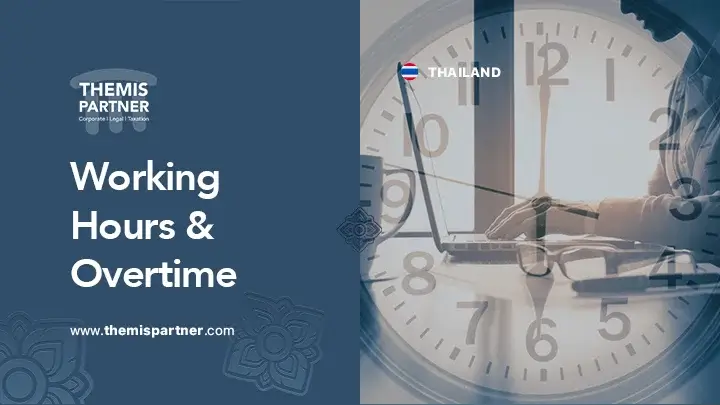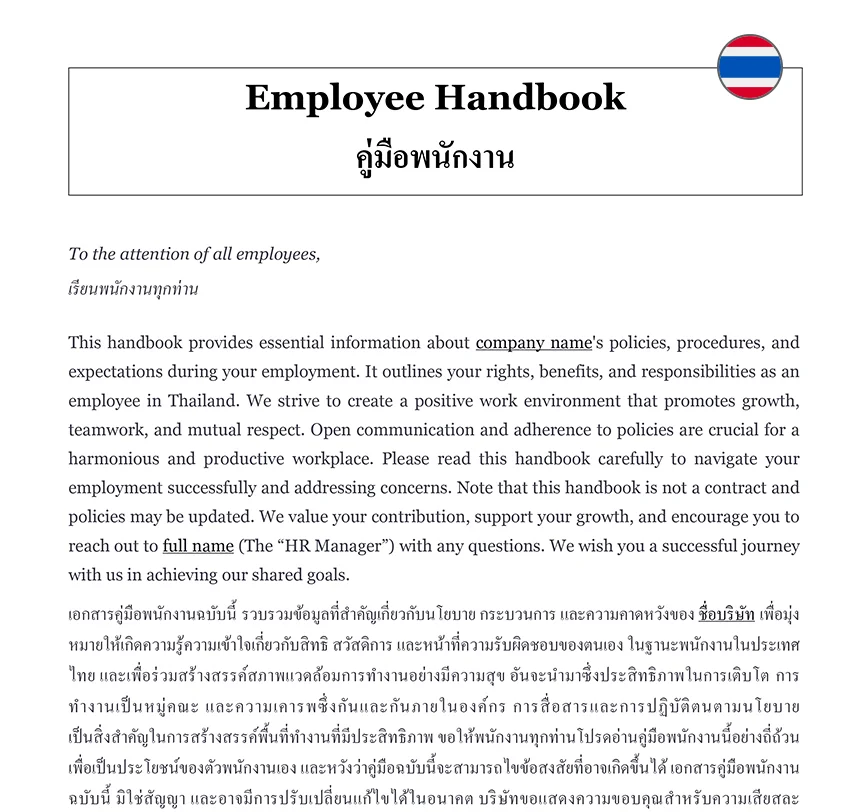Working hours and overtime laws in Thailand have never mattered more: in 2025, fines for noncompliance can now reach hundreds of thousands of baht, and new payroll audits affect every sector from retail to logistics. Are your policies built to prevent costly disputes and protect your business from penalties?

As the workplace landscape evolves, clear boundaries around shifts, breaks, and overtime consent have become essential for both employers and employees. Even longstanding rules on daily hour limits now come under sharper scrutiny, and digital consent records are a must during regulatory inspections.
Key Takeaways
- Working hours in Thailand are limited to 8 hours per day and 48 per week, or 7/42 for hazardous jobs.
- Employees must receive a 1-hour break after 5 hours and one rest day weekly.
- Overtime is capped at 36 hours weekly, paid at 1.5-3x the rate, and requires written consent.
- Keep accurate digital records for at least two years to stay compliant.
- Workers are entitled to 6 annual leave days, 98 days maternity leave and equal rights for locals and foreigners.
Looking to outsource HR & payroll?
Our team handle payroll, HR administration, PEO employment, and full visa and relocation support.
Table of Contents
-
Thailand Working Hours & Overtime Laws (2025)
-
Overtime Rules in Thailand
-
Overtime Pay in Thailand
-
Employee Rights in Thailand
-
Employer Strategies for Compliance
-
FAQ: Thai Working Hours & Overtime (2025)
-
Conclusion
Thailand Working Hours & Overtime Laws (2025)
Maximum Working Hours in Thailand
For 2025, the working hours and overtime laws in Thailand set clear daily and weekly limits for all sectors.
Employers must comply with the following maximums:
- Non-hazardous jobs: 8 hours per day, 48 hours per week
- Hazardous jobs (for example, construction, chemical handling): 7 hours per day, 42 hours per week
These limits are unchanged from previous years, reinforcing Thailand’s commitment to employee rights and safe working conditions.
Notably, any changes for 2025 primarily adjust minimum wage, not working hour caps.
For accurate guidance or legal text, refer to the Thai Department of Labour Protection and Welfare.
Rest Breaks & Weekly Day Off Rules
Labor law in Thailand requires:
- A minimum 1-hour break after 5 consecutive hours of work
- At least one full day off per week, most often on Sunday
- Paid public holidays throughout the year
Flexible scheduling is increasingly common, but statutory breaks and rest days cannot be waived.
Thailand’s approach emphasizes regularity and balance. The regulations empower both employees and employers to plan responsibly.
Overtime Rules in Thailand
Permitted Overtime & Employee Consent
Overtime in Thailand is strictly limited to 36 hours per week under the 2025 labor code.
To schedule overtime, an employer must:
- Obtain employee consent before any extra hours are worked
- Document consent in writing (paper or digital records)
- Make clear exceptions only in emergencies, such as urgent repairs or safety hazards
Employers must issue official overtime records, which are subject to inspection by labor authorities.
Penalties for Overtime Violations
Major penalties await companies breaking overtime regulations. Violations can result in:
- Monetary fines per breach, with rates updated annually
- Criminal liability if overwork causes harm or repeated offenses occur
- Public labor disputes, risking reputational and business consequences
Smart overtime policies, transparent consent, and up-to-date payroll documentation are the most effective ways for Thai employers to protect their organizations and workforce.
Overtime Pay in Thailand
Overtime Pay Rates & Calculations
In Thailand, overtime pay rates are set to ensure fair compensation and safeguard employee rights under the labor law Thailand framework.
Rates vary based on when the overtime occurs:
- Weekdays (beyond regular hours): 1.5 times the normal hourly wage
- Rest days or public holidays (regular hours): 1 times the normal wage
- Rest days or public holidays (overtime hours): 3 times the normal hourly wage
Employees must receive overtime payments by the next regular payday. For example, an employee earning THB 100 per hour will receive THB 150 per hour for weekday overtime or THB 300 per hour for overtime worked on a public holiday.
Part-time and temporary staff receive prorated overtime, based on actual hours worked. These rules create clarity and predictability, making it easier for businesses to plan payroll and avoid disputes.
Payroll & Documentation Compliance
Proper documentation and transparent payroll are key to minimizing risk and supporting regulatory audits:
- Use digital payroll software to track hours and calculate statutory overtime
- Maintain written records of employee consent and hours worked for at least two years
- Update HR policies to reflect new 2025 overtime regulations and communicate changes to all employees
Clear payroll records help prevent disputes and ensure fast resolution if issues arise. Staying audit-ready saves significant time and protects against possible fines or claims.
Employee Rights in Thailand
Breaks, Rest Days & Annual Leave
In 2025, Thailand’s labor law guarantees all employees essential rest and leave protections under the Labor Protection Act.
Statutory entitlements include:
- A minimum 1-hour break after every 5 consecutive hours worked
- At least one day off per week, often Sunday
- Paid public holidays (typically at least 13 days annually)
- Annual leave: at least 6 vacation days after one year of employment, prorated for part-time staff
These requirements apply equally to permanent, temporary, and part-time employees, supporting both work-life balance and legal compliance.
Recent changes for 2025 have left these core entitlements unchanged, but wage and leave policy compliance have moved into sharper focus for regulatory audits.
For a deeper understanding, read our Thailand minimum wage rates guide.
Employers who respect these foundations avoid most workplace disputes tied to working hours and overtime laws in Thailand.
Parental Leave & Work-Life Balance
Parental leave laws in 2025 continue to mandate at least 98 days of paid maternity leave for birth mothers.
Emerging trends include:
- Enhanced paternity leave in some sectors, with up to 15 days paid leave
- Growing demand for flex-work and hybrid scheduling, especially among new parents
- Increased scrutiny of compliance, especially after wage and scheduling updates
Organizations updating internal policies for parental leave or flexible scheduling can attract and retain talent more effectively.
Protecting regular breaks, annual leave, and parental rights is central to compliance with working hours and overtime laws in Thailand laying the groundwork for a supportive and legally sound workplace.
Employer Strategies for Compliance
Preventing Overtime & Hours Disputes
Direct, proactive management of working hours and overtime disputes is essential under the 2025 labor law Thailand requirements.
Employers can minimize risks by:
- Developing clear, compliant written policies on working hours and overtime consent
- Training staff regularly on rights and obligations under the Thai labor code
- Using digital timekeeping to record hours and prompt consent for overtime
A practical dispute-prevention plan includes:
- Written documentation of all overtime requests and employee responses
- Transparent communication of rules in both Thai and English
- Scheduled compliance audits utilizing payroll software and checklists
Modern Scheduling Without Legal Risk
Shifting to flexible hours, shift work, or hybrid models is possible within working hours and overtime laws in Thailand, provided compliance remains a priority.
Key steps include:
- Structuring shifts to stay within 8/48 or 7/42 maximum weekly hours
- Gaining employee consent in writing for all overtime outside emergencies
- Reviewing scheduling tools to ensure rest breaks and public holidays are observed
A transportation company in Bangkok implemented rotating shifts with digital consent tracking, reducing overtime disputes by 40% in one year.
To remain compliant and dispute-free, organizations must make policy, transparency, and precise scheduling their top priorities.
FAQ: Thai Working Hours & Overtime (2025)
Special Industry Exceptions
Certain sectors, such as hospitality, healthcare, and emergency response, may follow distinct working hours under the Thai labor code.
Sector-specific rules can set alternative maximum limits or flexible scheduling.
For example:
- Healthcare staff might be allowed split shifts or irregular break patterns.
- Hotels may use rotating schedules during peak seasons.
Overtime Records & Dispute Prevention
Accurate overtime records are crucial for both legal protection and payroll audit readiness.
Use secure, easy-to-access methods like:
- Cloud-based payroll software with audit trails.
- Physical timecards kept for at least two years (as minimum per the Thai labor code).
Sample Overtime Record Template:
- Employee name and role
- Work date and overtime hours
- Authorization signature
- Pay rate and payment date
Employee Refusal & Consent Rights
Employees can refuse non-emergency overtime per overtime regulations, and written consent is standard practice.
Key points:
- Consent is always required except during emergencies impacting safety or property.
- Clear written requests for overtime reduce misunderstandings.
- Refusal cannot be penalized in non-emergency situations.
Local vs. Foreign Worker Protections
Both local and foreign staff receive identical protections under Thailand’s labor law.
Differences relate only to visa or permit requirements, not to maximum weekly hours, overtime calculations, or employee rights.
Clear compliance with Thailand’s working hours and overtime laws benefits all parties and supports fair, productive workplaces.
Conclusion
Staying ahead of Thailand’s working hours and overtime laws empowers your organization to build trust, strengthen compliance, and unlock a culture of accountability.
Take charge today: Review your overtime consent process, audit your payroll documentation, communicate clear scheduling policies, and ensure break and leave entitlements are visible to every employee.
Contact us for expert guidance. Themis Partner specializes in transforming complex labor law requirements into simple, actionable steps that protect your business and support your people.


